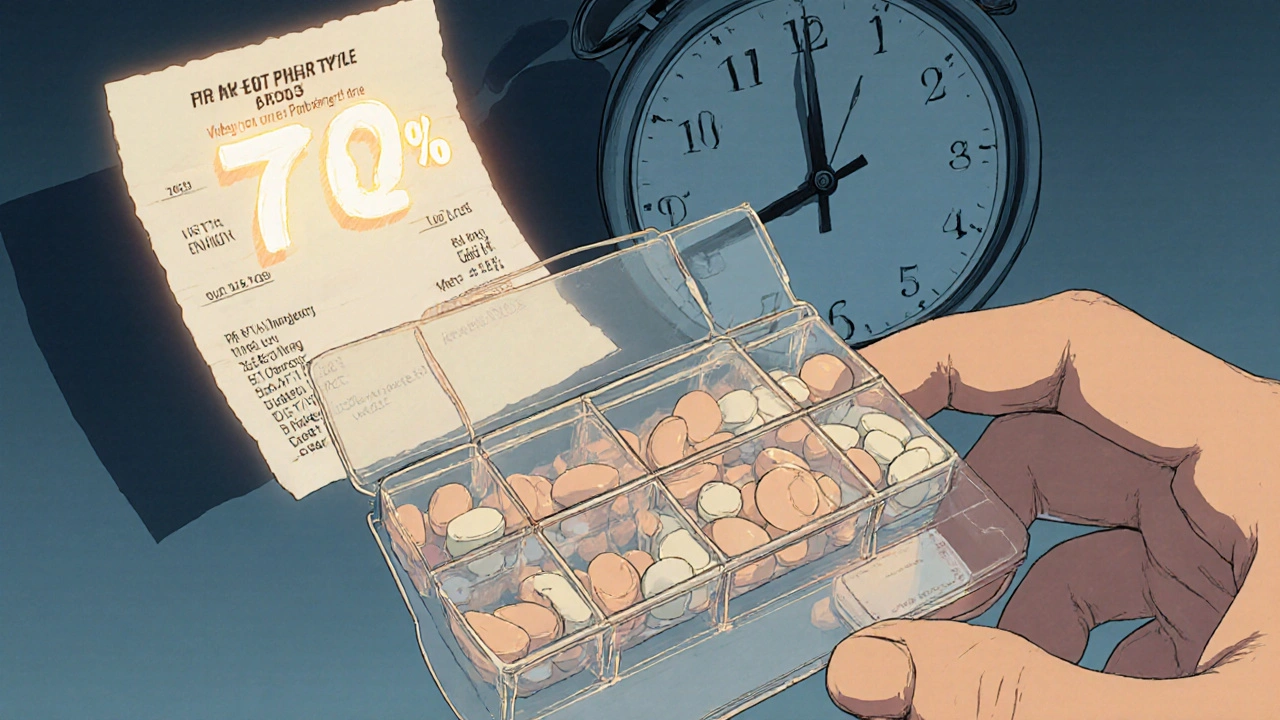
If you’re taking medication for high blood pressure, diabetes, or cholesterol, skipping doses isn’t just a small mistake-it’s a serious risk. More than half of people with chronic conditions don’t take their meds as prescribed. That’s not laziness. It’s forgetfulness, cost, side effects, or just not understanding why it matters. The result? Higher hospital bills, worse health, and even early death. The good news? You can measure your own adherence-and fix it.
Adherence isn’t just about taking pills. It’s three things: initiation (did you start?), implementation (are you taking them right?), and persistence (did you keep going?). You might fill your prescription but still miss doses. Or you might stop after a week because you felt fine. That’s not adherence. That’s incomplete treatment.
You don’t need fancy devices or lab tests. Here’s how to track your own adherence using methods doctors actually use-just adapted for your daily life.

There’s no single perfect way. Electronic caps that log when you open your pill bottle? Accurate-but expensive and not practical for most people. Blood tests? Too invasive. Pharmacy refill data? Great for big-picture trends, but doesn’t tell you if you threw the pills away. Self-reporting? Everyone overestimates their adherence. Studies show people think they’re 90% compliant when they’re really at 60%.
The best approach? Use two or three of the methods above together. A pill diary + monthly count + MARS score gives you a real, honest picture. Don’t wait for your doctor to ask. Do it yourself.

If your checklist shows you’re missing doses regularly, don’t panic. But don’t ignore it either. Here’s what to do next:
Medication non-adherence costs the NHS an estimated £500 million a year in avoidable hospital visits. That’s money taken from cancer screenings, mental health services, and diabetes education. When you take your meds as prescribed, you’re not just protecting your health-you’re helping the system work better for everyone.
And it’s getting easier. New tech is coming: smart pill bottles that text you when you miss a dose, apps that sync with your EHR, and AI tools that predict who’s at risk before they even miss a pill. But none of it works if you don’t know where you stand right now.
Grab a pen. Open your pill bottle. Count what’s left. Answer the MARS-5 questions. Look up your last refill date. Do this now-not tomorrow. You don’t need permission. You don’t need a fancy app. You just need to know the truth.
Adherence isn’t about being perfect. It’s about being aware. And awareness is the first step to change.
You’re taking your medication correctly if you’re following the exact dose, timing, and schedule your doctor prescribed-without skipping, delaying, or doubling up. Use a pill diary and monthly count to check. If your Proportion of Days Covered (PDC) is below 80%, or your MARS score is under 18, you’re likely missing doses. Don’t guess-track.
No. Many medications-like those for blood pressure, diabetes, or cholesterol-work silently. You won’t feel symptoms when they’re doing their job. Skipping doses lets your condition creep back. Even one missed day can raise your risk of complications. Take it as prescribed, even if you feel great.
Yes-but only partially. Pharmacy records show when you picked up your meds, not whether you took them. If you refill every 30 days on time, your PDC might be 100%, but you could still be tossing pills in the trash. Use refill data alongside a pill diary or MARS score for a full picture.
PDC (Proportion of Days Covered) is the gold standard for chronic meds. It only counts up to 100%-so if you refill early, extra pills don’t inflate your score. MPR (Medication Possession Ratio) can show over 100% because it counts all pills you’ve collected, even if you didn’t need them. PDC is more accurate and preferred by health systems like the NHS and Medicare.
Studies show that patients with PDC above 80% have significantly lower hospitalization rates, fewer complications, and better long-term outcomes. Below 80%, the risk of heart attack, stroke, or kidney failure jumps sharply. That’s why insurers and health plans use 80% as the benchmark-it’s the point where benefits start to drop off fast.
Yes. Many pharmacies in the UK offer free adherence counseling. Ask your pharmacist for a “medication review.” Your GP can also refer you to a clinical pharmacist who specializes in chronic disease management. There are also free apps like Medisafe and MyTherapy that send reminders and track your progress.
Don’t skip doses because of cost. Talk to your pharmacist or GP. In the UK, you can apply for a Prescription Prepayment Certificate (PPC), which caps your annual cost. You may also qualify for the NHS Low Income Scheme. Many drug manufacturers offer patient assistance programs. There are always options-just ask.
So let me get this straight-you’re telling me I need to keep a diary, count pills, answer five dumb questions, check pharmacy records, AND track refill gaps? Meanwhile my blood pressure is still high and my rent is due. This isn’t a checklist. It’s a full-time job for people who already have too many jobs.
The entire premise is built on a flawed assumption: that patients are rational actors. You’re treating adherence like a spreadsheet problem when it’s a psychological, economic, and systemic failure. The real metric isn’t PDC-it’s whether your healthcare system gives a damn about you outside of the clinic walls. 80% adherence? That’s not a benchmark. It’s a moral failure disguised as a statistic.
This is why America’s healthcare system is broken. They hand you a 12-page pamphlet on ‘adherence’ but won’t fix the $800 insulin co-pay. You can track every pill you take, but if you’re choosing between meds and groceries, your ‘non-adherence’ isn’t laziness-it’s survival. Stop blaming the patient. Fix the system.
Why do white people always think they can solve black problems with checklists? We got people in Lagos skipping meds because they can’t afford to eat. This post reads like a TED Talk written by someone who’s never seen a real hospital in the Global South
PDC? MARS-5? You lost me at ‘Proportion of Days Covered.’ I’m just here for the memes and the drama. Also, I took my meds yesterday. Maybe. Or was it the day before? Who even counts anymore?? 😅
I get that this checklist is well-intentioned, but let’s be real-many of us don’t have stable housing, let alone a fridge to stick notes on. I’ve seen people in my township refill prescriptions only to sell the pills for food. The problem isn’t that they don’t know how to adhere. It’s that the system has given up on them. Maybe we need to start with dignity, not diaries.
i just wanna say thank you for writing this. i’ve been taking my bp meds for 5 years and i never knew about pdc. i thought i was doing fine til i counted my pills last month and realized i’d missed 12 doses. i started using the notes app on my phone now. small steps, right?
This is actually really helpful. I’ve been struggling with my diabetes meds for years and never realized how much my ‘I feel fine’ mindset was hurting me. The MARS-5 questions hit hard. I’m printing this out and putting it next to my coffee maker. Thanks for the nudge.
In India, many people take Ayurvedic herbs alongside their prescription-no one tells them this might interact. This checklist is great but misses cultural context. Also, I’ve seen patients who skip doses because their doctor never explained why the pill matters. Knowledge gap > compliance gap. 🙏
this is lit!! 😎 i use my medicine app now and it sends me emojis when i take my pills. 🩹💊💯 also my pharmacist gave me a free pill box with days of week. life changed. keep sharing this stuff!
The MARS-5 is a joke. It assumes people can self-report accurately. We know from behavioral economics that humans are terrible at this. If you really want data, use electronic monitoring. Otherwise, you’re just giving people a guilt trip disguised as a tool.
Who’s really behind this? Big Pharma? They want you tracking your pills so they can sell you more apps, more sensors, more ‘adherence solutions’-while the price of the actual drug goes up 300%. This isn’t health. It’s surveillance capitalism wrapped in a white coat.
I’ve been taking my meds for 10 years and I’m still scared. What if I’m not taking them right? What if I’m secretly killing myself? I cry every time I open the bottle. This checklist just made me feel worse. Can someone just hug me?
Wait-so if I refill my meds 3 days early, does that count as over-adherence? Or does it just mean I’m paranoid? Also, does the MARS-5 account for people who take meds because they’re scared of the doctor, not because they believe in them? Just wondering. I’m not judging. I’m just… curious.
I appreciate this. But I have to say-I’m not sure I trust any of this. I’ve had doctors lie to me about side effects. I’ve had pharmacists act like I’m dumb for asking questions. So why should I trust a checklist written by someone who’s never had to choose between my meds and my kid’s school supplies?